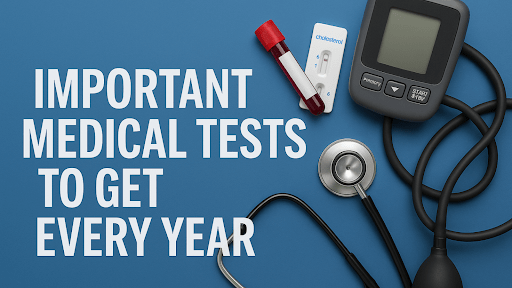Introduction
Staying healthy isn’t just about eating well or exercising regularly. One of the smartest ways to protect your health is by getting regular medical checkups. Many people only visit the doctor when something feels wrong. But by then, problems may already be serious. That’s why doctors recommend yearly medical tests. These simple tests can help catch diseases early, sometimes even before symptoms begin.
Whether you feel healthy or not, regular health screenings help track your body’s changes and prevent surprises down the road. In this article, we will explore the most important medical tests adults should get every year and why they matter. These tests are easy to do and give you peace of mind about your well-being.
Why Annual Health Checkups Are Important
Yearly medical tests are not just about spotting illness. They are about understanding your body, keeping your health in check, and giving you a chance to make positive lifestyle changes before anything gets serious. Regular checkups help:
- Detect problems early
- Monitor existing conditions
- Provide a full picture of your health
- Guide you and your doctor in making better choices
Whether you’re in your 20s or 60s, these tests are essential in building a longer, healthier life.
1. Complete Blood Count (CBC)
A complete blood count is one of the most common tests. It checks your red and white blood cells, platelets, and other blood parts. This test can detect signs of anemia, infections, and even some cancers. If you’re feeling tired, weak, or have regular infections, your doctor may pay special attention to this test.
2. Blood Pressure Measurement
Blood pressure shows how hard your heart works to pump blood. High blood pressure is known as the “silent killer” because it often has no symptoms but can lead to heart attacks and strokes. A simple reading once a year (or more often if needed) helps track heart health.
3. Cholesterol Test
This test measures the levels of good (HDL) and bad (LDL) cholesterol in your blood. Too much bad cholesterol can clog your arteries, increasing the risk of heart problems. Doctors recommend starting this test from your 20s and repeating it every year, especially if you have a family history of heart disease.
4. Blood Sugar Test
This test measures the amount of sugar in your blood. It helps detect diabetes or prediabetes. If caught early, diabetes can often be managed or reversed with lifestyle changes. High sugar levels may not show symptoms until it’s too late, so this test is very important.
5. Body Mass Index (BMI)
BMI is a simple measurement of weight compared to height. It helps doctors assess whether you are underweight, at a healthy weight, overweight, or obese. A high BMI is linked to health issues like diabetes and heart disease. It’s a useful yearly check to guide diet and exercise choices.
6. Skin Check
Doctors recommend a skin check every year, especially for people who spend time in the sun. A skin exam helps catch signs of skin cancer early. Look out for moles that change shape or color. Early treatment saves lives.
7. Vision Test
Eyes change with age, even if you don’t wear glasses. A yearly vision test helps check your eyesight, eye pressure, and the health of your retina. It can detect early signs of conditions like glaucoma, cataracts, or eye damage from diabetes.
8. Dental Checkup
Visiting the dentist once or twice a year helps more than your smile. Oral health is connected to heart health and overall wellness. Dentists look for cavities, gum disease, and early signs of oral cancer.
9. Hearing Test
Even if you think your hearing is fine, regular tests are helpful—especially as you age. Hearing loss can affect your communication, balance, and even your memory. Catching it early means better options for treatment or hearing support.
10. Liver Function Test
This test checks how well your liver is working. It’s especially important if you take regular medications, drink alcohol, or have a family history of liver issues. The liver plays a big role in filtering toxins from the body.
11. Kidney Function Test
The kidneys help clean your blood and remove waste. A yearly test checks for signs of kidney problems, which can happen silently over time. Early diagnosis makes a big difference in treatment.
12. Pap Smear and Pelvic Exam (For Women)
Women should get a Pap smear every year or as advised by their doctor. It checks for early signs of cervical cancer. A pelvic exam can also identify infections or other health concerns in the reproductive organs.
13. Prostate Exam (For Men)
For men over 40 or those at higher risk, a yearly prostate check helps catch early signs of prostate problems or cancer. It’s a simple test that can make a big difference.
14. Mammogram (For Women)
Women over 40 are advised to get a mammogram every year. This test screens for breast cancer. Like many conditions, breast cancer is most treatable when caught early.
15. Bone Density Test
This test checks for signs of weak bones or osteoporosis. It’s important for older adults, especially women. Strong bones help prevent serious injuries from falls.
16. Vitamin and Mineral Tests
Doctors may check your levels of vitamin D, iron, B12, and calcium. Low levels can make you feel tired, moody, or weak. These tests help ensure your body has what it needs to stay active and alert.
Tips to Prepare for Yearly Tests
- Schedule appointments ahead of time
- Write down questions or symptoms to discuss with your doctor
- Fast if needed before blood tests (ask your doctor first)
- Bring a list of medications or supplements you take
- Keep past test records to track changes over time
These simple steps make the process smooth and help your doctor give better advice.
How to Make It a Habit
Keeping your health in check doesn’t have to be difficult. Pick a month each year for your checkup—like your birthday month. Set reminders, keep test reports safe, and talk openly with your doctor. Making health a priority once a year leads to a stronger, happier life.
Conclusion
Getting yearly medical tests is one of the best things you can do for your health. These simple checkups help catch problems early, guide healthy choices, and give you peace of mind. From checking your blood to examining your eyes, each test plays a small but important role in keeping your body strong.
Make annual health checkups part of your life routine. A small step today can prevent bigger problems tomorrow. Take care of your body, and it will take care of you.












